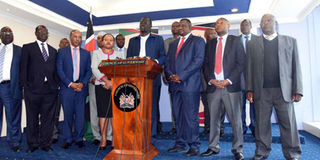Devolution meet ought to craft cure for perennial cash crunch

Council of Governors chairman Josephat Nanok, accompanied by other governors, addresses a press conference at Delta House, Nairobi, on March 5, 2018, regarding forest cover. PHOTO | EVANS HABIL | NATION MEDIA GROUP
What you need to know:
- The devolution conference is not the property of national government, where the President might have a say on the guest list.
- Mr Odinga and President Kenyatta sharing the stage at the conference would only be meaningful if they used the opportunity to unveil a roadmap to the national dialogue many expect should be the real gain from their dalliance.
A lot of buzz has been generated by the invitation for Opposition leader Raila Odinga to address the 5th Annual Devolution Conference.
The invite is interpreted as evidence of gains from the truce struck between Mr Odinga and President Uhuru Kenyatta that has gone some way towards cooling the toxic post-election environment.
That would seem to be stretching things a little bit.
First, there is nothing really new here, because the Opposition chief has attended and addressed devolution conferences in the past and that has never been taken as a sign of some political rapprochement.
NATIONAL GOVERNMENT
Secondly, the devolution conference is not the property of national government, where the President might have a say on the guest list.
It is ‘owned’ by the independent and non-partisan Council of Governors, currently chaired by Turkana Governor Josephat Nanok, who, incidentally is from Mr Odinga’s party, the Orange Democratic Movement (ODM).
It would, therefore, seem that the invite is being over-hyped. The reality is, it’s a pretty meaningless gesture that should not mislead him, or his legions of supporters, into thinking that he has now ‘arrived’ and gained admission to sup with kings at the high table.
Mr Odinga and President Kenyatta sharing the stage at the conference would, perhaps, only be meaningful if they used the opportunity to unveil a roadmap to the national dialogue many expect should be the real gain from their dalliance.
PRESSING ISSUES
Since they jointly addressed the press and concurred on the pressing issues that need to be urgently resolved if Kenya is not to be forever under the threat of ethno-political violence, they have gone mum.
The joint secretariat appointed to drive the process has had more than adequate time to design the framework and seek public input but has been working in an opaque and secretive manner that does not answer the many questions being asked.
President Kenyatta and Mr Odinga now need to come out clearly and answer these questions:
Did the handshake mark acknowledgment of the need for a national conversation or was it merely a truce between two individuals or for two families whose dynastic feud has held Kenya hostage since the early years of Independence?
DEAL
Are we setting the stage for an honest national dialogue or simply preparing the ground for yet another ‘come, let us eat together’ deal which simply sweeps our deep-seated problems under the carpet until the inevitable eruption come the next election?
We cannot wait indefinitely for answers to these burning questions. The longer it takes to provide clarity, the more doubts are raised about the value of a handshake whose most evident outcome so far has been a neutering and decapitation of the Opposition.
Meanwhile, the Jubilee government continues untrammelled with evil designs to destroy the Judiciary, the media, civil society and all other institutions that can keep creeping dictatorship at bay.
DISTRACTED
In the meantime, however, we must not be distracted from the import of the Devolution Conference.
This year’s edition must go beyond the annual talkfest to take critical and honest appraisal and present radical solutions to inherent shortcomings.
We approach the conference against a background of devolved governments almost screeching to a halt in recent weeks because of delayed remittance of funds from the National Treasury.
Governors will have the ritual whining about lack of funds and President Kenya will repeat his usual mantra that his government is already giving much more than the 15 per cent of national revenue stipulated in the Constitution.
We need to think of a solution where counties do not depend on the generosity of the national government.
EQUALISATION FUND
Other than the Equalisation Fund, counties should be challenged to generate their own funds. They must be able to meet their own public service payrolls, pay the salaries of their governors, executives and county assemblies and fund all their devolved functions from local resources according to their varied capacities.
Instead of tax revenue all going to the centre and being re-distributed, counties should keep a share of national taxes generated within its jurisdictions to make it their main source of income in addition to local levies.
That way, we can properly assess the viability of devolved units and force them to live within their means.
[email protected] Twitter: @MachariaGaitho





